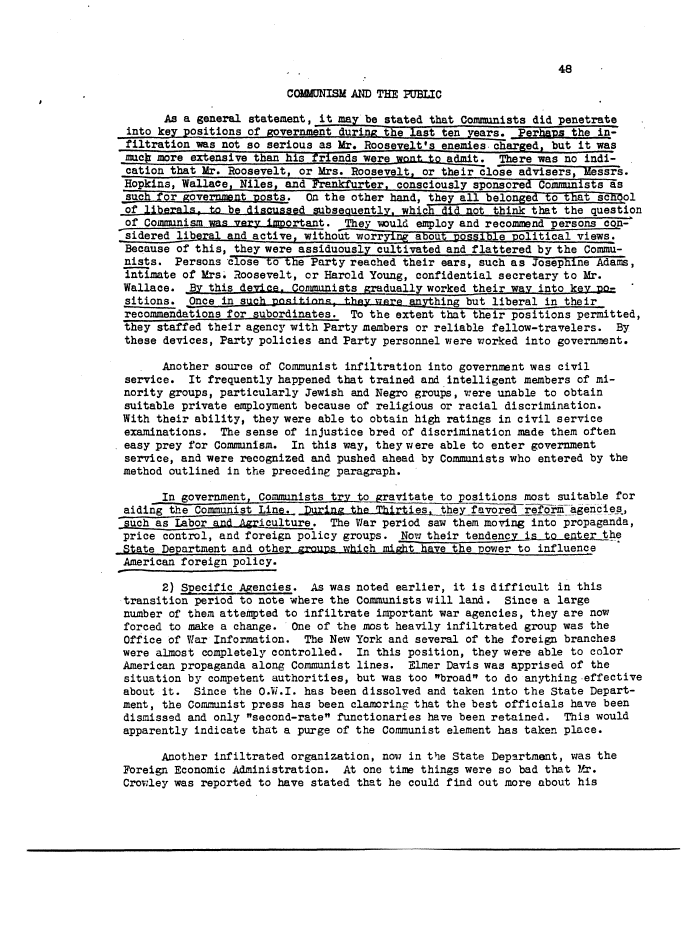 |
||||
 |
||||
| 48 COMMUNISM AND THE PUBLIC As a general statement, it may be stated that Communists did penetrate into key positions of government during the last ten years. Perhaps the in^ filtration was not so serious as Mr* Roosevelt^ enemies charged, but it was jmicfc more ertensive than his friends were wont to admitTThere was no indi- cation that Mr. Roosevelt, or Mrs. Roosevelt, or their close advisers, Messrs. Hopkins, Wallace, Niles, and Frankfurter, consciously sponsored Communists as such for government posts* On the other hand, they all belonged to that scnool of liberals, to bg discussed subsequently, which did not think that the question ^of Communism was very impprtant. They would employ and recommend persons CQn- ^sidered liberal and active t without worrying about possible political viewsT" Because of this, they were assiduously cultivated and flattered by the Commu- nists. Persons close to the Party reached their ears, such as Josephine Adams, intimate of Mrs. Roosevelt, or Harold Young, confidential secretary to Mr. Wallace. By this device, ^nmmnnists gradually worked their way into key po*- sitions. Once in ayo^ poaUHnna, t.hoy M^-PP anything but liberal in their recommendations for subordinates. To the extent that their positions permitted, they staffed their agency with Party members or reliable fellow-travelers. By these devices, Party policies and Party personnel were worked into government. Another source of Communist infiltration into government was civil service. It frequently happened that trained and intelligent members of mi- nority groups, particularly Jewish and Negro groups, were unable to obtain suitable private employment because of religious or racial discrimination. With their ability, they were able to obtain high ratings in civil service examinations. The sense of injustice bred of discrimination made them often easy prey for Communism. In this way, they w ere able to enter government service, and were recognized and pushed ahead by Communists who entered by the method outlined in the preceding paragraph. In governmentf Communists try to gravitate to positions most suitable for aiding the Communist Line. purin% the Tfr^rties, they favored i'eform'agenciejL, such as Labor and Agriculture. The War period saw them moving into propaganda, price control, and foreign policy groups. Now their tendency is to enter the State Department and other groups which might have the -power to influence American foreign policy. 2) Specific Agencies. As was noted earlier, it is difficult in this transition period to note where the Communists will land. Since a large number of them attempted to infiltrate important war agencies, they are now forced to make a change. One of the most heavily infiltrated group was the Office of War Information. The New York and several of the foreign branches were almost completely controlled. In this position, they were able to color American propaganda along Communist lines. Slmer Davis was apprised of the situation by competent authorities, but was too "broad" to do anything effective about it. Since the O.W.I, has been dissolved and taken into the State Depart- ment, the Communist press has been clamoring that the best officials have been dismissed and only "second-ratew functionaries have been retained. This would apparently indicate that a purge of the Communist element has taken place. Another infiltrated organization, now in the State Department, was the Foreign Economic Administration. At one time things were so bad that Mr. Crov;ley was reported to have stated that he could find out more about his |